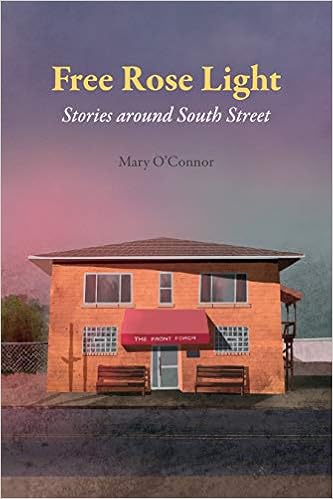 Reviewed by Magdalena Ball
Reviewed by Magdalena Ball
Free Rose Light
By Mary O’Connor
The University Of Akron Press
September 28, 2021, Paperback, 208 pages, ISBN-13: 978-1629221274
Mary O’Connor may have made her career as an architect, but her debut book shows her to be one heck of a writer. Her prose is tight, well-paced, and often exquisite. She balances fact and emotion with perfect precision, using a blend of memoir, reportage, biography, and social history to make Free Rose Light a rich and creative book that is both about its subject and transcendent. I do imagine that this is a book which will particularly appeal to, and is pitched towards, readers who are familiar with the streets of Akron, Ohio, where it is set. But O’Connor sets the scene so well, with so much careful detail, that it is easy to visualise the scenes she describes. The main character in the book is Pastor Duane Crabbs, who set up the Akron’s South Street Ministries with his wife Lisa. Crabbs is a compelling character, whose desire to do good, almost at all costs, is depicted with a deep admiration that makes him likeable. Many other characters pivot around Duane, whose desire to help his community creates its own gravity. There is Duane’s wife Lisa of course, and his growing family–a story in and of itself, as well as many others like the charismatic Patrick Armour who became something of a partner for Duane, teaching him about life in South Akron, and working with him to engage the local, mostly black community. Other characters include Eric Harmon, a former convict who works on a cafe called the “Front Porch Cafe”, Stephanie Leonardo (“Leo”) a former art teacher who takes on a community arts project, and Donovan Harris, another convict who comes to work at Duane and Lisa’s Front Porch Fellowship. O’Connor has a way with characterisation, with an observant eye that brings people to life, combining description and action:
Whatever cover he might have had coming in with Patrick evaporated when Duane sat alone at the bar. Though he wanted to be a pastor of souls, he looked like a cop. His cool firefighter self was starting to sweat. This discomfort was not part of the evangelical crusade he anticipated. He ran hot to Patrick’s cool. He tried to keep his coiled energy neutral, to keep the gaze of his wild sloping eyes level.
Free Rose Light is written as a series of stories revolving around the ministry. There’s an immediacy and intimacy in the writing that brings the reader into the moment:
We are sitting at one of the smaller round tables in the cafe. Though I’m taking notes, I have to remind myself to do so, because it’s hard to take my eyes off Patrick as he speaks. He speaks a poetry, mixing past, present and future in a floating association of big and small concepts, thoughts, memories and feelings. It’s unique, familiar, and utterly strange.
Each of the chapters is somewhat self-contained, taking a slightly different vantage, though the book does progress in a mostly linear way with respect to the Crabbs, who are a constant through everyone else’s stories. The recurring themes are overcoming adversary, the nature of family, of deep faith and substantial sacrifice. Duane keeps convincing his wife Lisa to give up one comfort after another—trading a well-paid fire-fighting job for a lower paid one, and then moving from their home to one in the lower socioeconomic area of Summit Lake near the ministry. O’Connor does a perfect job of moving between the back stories of her characters and present day, managing the time shifts with an immediacy that feels natural. Her own story is subtly woven throughout the book, from her ‘temporary’ move to Akron to help renovate the ministry through to her role as the Crabbs’ biographer. While it’s obvious that O’Connor is keen to stay in the background, her own story has a powerful arc and creates a scaffold for the book.
What I came to find out as a would-be biographer was that I was setting the conditions for my true self to emerge. Maybe it’s a shift of light, drawing attention to something not seen before. Maybe it’s the bravery fo one voice becoming a chorus that does it.
The true sense that emerges out of this book, which took some eight years to write, is one where civic responsibility is more than just an obligation. O’Connor’s own coming-of-age story covers friendship, desire and loss, but also something that can only be called a gift–that ‘free rose light’ given by “the authentic God of noticing.” Free Rose Light is a lovely book to read, full of such moments of momentous light.